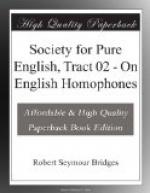[Footnote 18: This is a very common condition. The habitual pronunciation is associated in the mind with the familiar eye-picture of the literary printed spelling so closely that it is difficult for the speaker to believe that he is not uttering the written sounds; but he is not competent to judge his own speech. For instance, almost all Englishmen believe that the vowel which we write u in but, ugly, unknown, &c., is really a u, like the u in full, and not a disguised a; and because the written s is sometimes voiced they cannot distinguish between s and z, nor without great difficulty separate among the plural terminations those that are spoken with an s from those that are spoken with a z. I was shocked when I first discovered my own delusions in such matters, and I still speak the bad Southern English that I learnt as a child and at school. I can hardly forgive my teachers and would not myself be condemned in a like reprobation.]
Again, and in support of the trustworthiness of the records, I am told by those concerned in the business that for some years past no Englishman could obtain employment in Germany as teacher of English unless he spoke the English vowels according to the standard of Mr. Jones’ dictionary; and it was a recognized device, when such an appointment was being considered, to request the applicant to speak into a machine and send the record by post to the Continent; whereupon he was approved or not on that head by the agreement of the record with the standard which I am about to illustrate from the dictionary.
All these considerations make a strong case for the truth of Mr. Jones’ representation of our ‘standard English’, and his book is the most trustworthy evidence at my disposal: but before exhibiting it I would premise that our present fashionable dialect is not to be considered as the wanton local creator of all the faults that Mr. Jones can parade before the eye. Its qualities have come together in various ways, nor are the leading characteristics of recent origin. I am convinced that our so-called standard English sprang actively to the fore in Shakespeare’s time, that in the Commonwealth years our speech was in as perilous a condition as it is to-day, and at the Restoration made a self-conscious recovery, under an impulse very like that which is moving me at the present moment; for I do not look upon myself as expressing a personal conviction so much as interpreting a general feeling, shared I know by almost all who speak our tongue, Americans, Australians, Canadians, Irish, New Zealanders, and Scotch, whom I range alphabetically lest I should be thought to show prejudice or bias in any direction. But this is beyond the present purpose, which is merely to exhibit the tendency which this so-called degradation has to create homophones.
[Sidenote: Mauling of words.]




